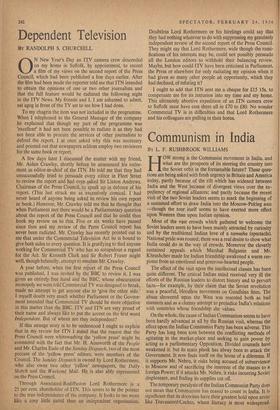Dependent Television
BY RANDOLPH S. CHURCHILL 0 N New Year's Day an ITV camera crew descended on my home in Suffolk, by appointment, to record a film of my views on the second report of the Press Council, which had been published a few days earlier. After the film had been made the reporter told me that ITN intended to obtain the opinions of one or two other journalists and that the full feature would be radiated the following night in the ITV News. My friends and I. 1 am ashamed to admit, sat agog in front of the TV set to see how I had done.
To my chagrin the item was not included in the programme. When I telephoned to the General Manager of the company he explained that though my part of the programme was `excellent' it had not been possible to radiate it as they had not been able to procure the services of other journalists to defend the report. 1 at once asked why this was necessary and pointed out that newspapers seldom employ two reviewers for the same book or report.
A few days later I discussed the matter with my friend, Mr. Aidan Crawley, shortly before he announced his retire- ment as editor-in-chief of the ITN. He told me that they had unsuccessfully tried to persuade every editor in Fleet Street to review the report and had even asked Sir Linton Andrews. Chairman of the Press Council, to speak up in defence of his report. (This last struck me as excessively comical. I had never heard of anyone being asked to, review his own report or book.) However, Mr. Crawley told me that he thought that when Parliament met there would be a Parliamentary question about the report of the Press Council and that he could then hook my review on to this. Five or six weeks have passed since then and my review of the Press Council report has never been radiated. Mr. Crawley has recently pointed out to me that under the Commercial Television Act he is bound to give both sides to every question. It is gratifying to find anyone working for Commercial TV who has so scrupulous a regard for the Act. Sir Kenneth Clark and Sir Robert Fraser might well, though belatedly, attempt to emulate Mr. Crawley.
A year before, when the first report of the Press Council was published, I was invited by the BBC to review it. I was given an entirely free hand and the BBC, whose obscurantist monopoly we were told Commercial TV was designed to break, made no attempt to get anyone else to 'give the other side.' I myself doubt very much whether Parliament or the Govern- ment intended that Commercial TV should be more objective in this matter than the BBC. ITV and ITN are very proud of their name and always like to put the accent on the first word Independent. But of whom are they independent?
If this strange story is to be understood I ought to explain that in my review for ITN I stated that the reason that the Press Council were whitewashing the 'yellow press' might be connected with the fact that Mr. H. Ainsworth of the People and Mr. Charles Eade of the Sunday Dispatch, two of the most peccant of the 'yellow press' editors, were members of the Council. The Sunday Dispatch is owned by Lord Rothermere, who also owns two other 'yellow' newspapers, the Daily Sketch and the Weekend Mail. He is also ably represented on the Press Council.
Through Associated-Rediffusion Lord Rothermere is a 25 per cent. shareholder of ITN. This seems to be the pointer to the true independence of the company. It looks to me more like a cosy little cartel than an independent organisation. Doubtless Lord Rothermere or his hirelings could say that they had nothing whatever to do with suppressing my genuinely independent review of the second report of the Press Council. They might say that Lord Rothermere, wide though the rami- fications of his interests may be, could not possibly persuade all the London editors to withhold their balancing review. Maybe, but how could ITV have been criticised in Parliament. the Press or elsewhere for only radiating my opinion when it had given so many other people an opportunity, which they had declined, of refuting it?
I ought to add that ITN sent me a cheque for £15 15s. to compensate me for its intrusion into my time and my home. This ultimately abortive expedition of an ITN camera crew to Suffolk must have cost them all in £70 to £80. No wonder Commercial TV is in difficulties and that Lord Rothermere and his colleagues are pulling in their horns.


































 Previous page
Previous page